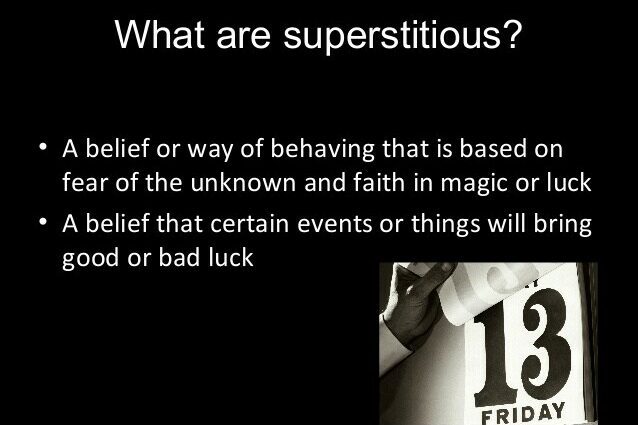Mataupu
Fa'ailoga, fa'ailoga mua'i va'ai: aisea e te fa'atautuu ai?
The human being is made thus: of superstitious beliefs and behaviors! Few of us admit it, but we attach more importance than we think to small signs, fetish objects, but also parascientific disciplines, such as astrology, clairvoyance or the lines of the hand. Where do these beliefs and behaviors come from? Why are we doing this?
What is superstition?
Superstition is an irrational belief. A cause and effect link is maintained between an action performed and an event observed. Depending on whether or not one has followed belief rituals, the event produced is perceived as a fatal, happy or unhappy consequence.
For example, finding a four-leaf clover would therefore be an omen of luck and happiness. If something good happens to us as a result of this discovery, we will attribute this fact directly to the superstitious sign. Or, if we go under a ladder, and an unpleasant or unfortunate event happens to us afterwards, we will likewise attribute our misfortune to this ladder that we have not bypassed.
Many artists and athletes readily admit to being superstitious: some explain that they follow a specific ritual, or have particular objects on them before a sports meeting, a concert. They even explain a strange feeling of appeasement, of control, in following these rituals or keeping these objects close, be it a garment, a lighter, an amulet, a coin. But everyone follows, before each important event (an exam, a health operation, an interview, etc.) these styles of rituals. We then believe that we will have been more efficient than if we did not have this superstition to help us.
What are the reasons for our superstition?
Psychologists identify three reasons for superstitious beliefs and behaviors. As we have mentioned, the rituals of superstition appease. If they soothe, it is because there is initially an anxiety, in view of an event for example:
- the first cause is therefore to reduce the anxiety that occurs in us, by producing a “control” effect. This allows us to create the illusion that we have a better grip on the unfolding of events, on the world in general. But of course, this is an illusion! Believing this has an antidepressant effect: removing the illusion of control would condemn us to resignation and depression. Although our superstitions are in fact rationally ineffective, they help us to feel better, and to be more serene in the face of the world and its events;
- the second cause of our superstition is that connection we seek between our actions and randomly produced events. It allows us to give meaning to our actions, and in general to our life. Finding coincidences on every street corner still reassures us about our power to change the world, through small, insignificant acts;
- finally, superstition allows us to find new ideas, thanks to analogical thinking. We quickly find similarities, analogies, associations between words and concepts. We like this because these analogies are inexplicable and therefore mysterious. They keep us in the “magic”, the supernatural, the unknown power of life and the world. For example, we will think we are escaping an accident because we have avoided the black cat on the corner of the street.
What are the foundations of superstition?
Superstition is known to scientists today to have an adaptive advantage over mankind. Seeing things hidden behind trivial events would allow us to make more associations. This attitude is favored by the natural evolution of man, because it favors the rapid increase of our knowledge and our culture. They allow humans to develop their capacity for learning, by associating words with concepts and events.
Thus, the important human advances such as language, technical knowledge, science would be in part at the origin of superstitious beliefs and “magical” thoughts, although the latter do not have a rational origin.
Being Superstitious: Advantage or Disadvantage?
Some aspects show us that there are advantages to having small rituals of superstitious beliefs. Before an event, it therefore helps us to reassure ourselves, to disinhibit ourselves to be more efficient, to remove anxiety and to believe that we are more powerful.
But beware: having too many belief rituals can also prevent our proper development and the unfolding of our actions. Fear can take precedence over action and prevent us from living our life socially, in a certain harmony. A few rituals of superstition will not hurt us; however, it is all about measurement and our ability to be right.










